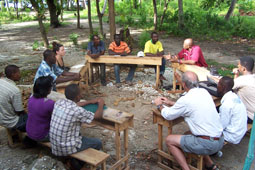Education After Devasation: Penn GSE in Haiti
April 7, 2011 - For Sharon Ravitch, the ultimate goal for the burgeoning partnership she’s developing in Haiti is simple: “In the end, I’m hoping we’re obsolete.”
Her goal might seem counter-intuitive, but Ravitch insists it is the best and only appropriate approach: “We don’t buy into the expert-learner binary,” Ravitch explains, pointing out that instead of telling the Haitian Ministry of Education how to “fix” their education system, her team is working side-by-side with the Ministry to “build the capacity they already have.”  In other words, the long-term partnership between Penn GSE and the Haitian Ministry of Education aims to establish a “hearty, healthy, and high-quality education system” in Haiti that is sustainable on its own rather than being dependent on outside help.
In other words, the long-term partnership between Penn GSE and the Haitian Ministry of Education aims to establish a “hearty, healthy, and high-quality education system” in Haiti that is sustainable on its own rather than being dependent on outside help.
Ravitch, a Senior Lecturer at Penn GSE who is expert in applied international educational development, was asked to partner with the Ministry of Education in Haiti shortly after the 2010 earthquake ravaged the country. Her team includes Laura Colket, a doctoral student in Penn GSE’s Education Leadership program; master’s students Yve-Car Momperousse and Ralph Bouquet; David Land, a veteran of NGO work in Haiti; and Wagner Marseille, an alumnus of Penn GSE’s Mid-Career Doctoral program.
On an early trip to the island nation, Ravitch and her team met with the top cabinet of the Ministry of Education, including the minister. Ravitch describes it as “an unbelievably generative meeting” that resulted in a partnership led by Dr. Creutzer Mathurin, a senior leader in the Ministry. In December 2010, Ravitch was named the Senior International Advisor to the Ministry.
“What’s unique about this is the way we have fairly quickly been able to develop a very deep trust with our partners at the Ministry,” Ravitch says. “It’s a quite powerful collaboration in that sense.”
The partnership between Penn GSE and the Haitian Ministry of Education is designed to be “structured enough to build capacity and leadership, and flexible enough to respond to needs as they emerge.” Ultimately, though, the partnership is about “capacity building.”
Ravitch describes the goals of the Penn GSE–Haiti partnership as threefold. First on the agenda is institutional and professional development for members of the Ministry of Education, educational directors, and teachers. The partners also aim to develop the National Institute of Studies and Educational Research (INERE), a research institute that will serve as the center of innovation for professional, economic, social, and educational development. And eventually, the partnership aims to create a public university in Jacmel, a city on Haiti’s southern coast.
Characterizing her work as coordination, Ravitch points out that, with several other Penn people and a number of international NGOs already active in Haiti, it is important not to reinvent the wheel.
Still, she argues that while international relief efforts in Haiti are well-intentioned, many are founded on the assumption that Haiti is deficient, lacking the skills, knowledge, and expertise to rebuild its infrastructure on its own.
“We don’t buy that as a value or an ideology,” Ravitch says. “[The people of Haiti] have a lot of expertise and wisdom; people are walking around with all sorts of credentials. We are figuring out what’s there to build on and cultivate.”
With that in mind, much of the work she and her team are undertaking is to coordinate support and involvement from Haitians, both those in country and those abroad.
“This has to be Haitian,” Ravitch says. “It has to stay there.”
